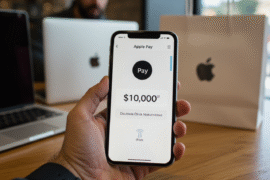This article may contain references to products or services from one or more of our advertisers or partners. We may receive compensation when you click on links to those products or services. Nonetheless, our opinions are our own.
In finance, you often run into certain terms. You might understand them, but you may not. If you don’t, you must learn them if you’re making financial decisions that involve that terminology.
For instance, it’s important to understand how APY works. You might run into that term a lot, but not everyone knows what it means.
We’ll talk about the APY concept right now. When we finish, you can speak confidently about this term when you encounter it in your life.
What Does APY Mean?
APY stands for annual percentage yield. If you’re putting money in a savings account in the bank, you might wonder how much you’ll get back from it as the year progresses. If you don’t feel like you’ll get enough, you may put the money somewhere else, like into an IRA or CD.
Your financial institution will mention the APY somewhere in their advertising or on their website or app when you look at a savings account. The higher the APY, the better it is for you. The larger this number, the more money you will get if you leave your cash in the savings account for a whole year.
With a savings account, the APY means the total monetary amount you’ll get on an interest-bearing account, assuming you leave the money in there for the entire twelve-month period. Bankers call this process annualizing.
Will You See an APY with Other Financial Vehicles Besides Savings Accounts?
You can sometimes see the APY come into play with other investment or monetary vehicles besides savings accounts. For instance, some checking accounts come with an APY attached. You might also see one if you are putting money into a money market account. You’ll see one with a CD, or a certificate of deposit.
How Can You Get the Highest APY?
We mentioned that you want a higher number with APY because that means more money coming to you as interest if you leave your investment in the account or other financial vehicle for an entire year. Checking accounts usually don’t have very high APYs, though.
That’s because the money you put in a checking account will likely come out again just as quickly. Checking accounts exist as ready cash for you whenever you need to pay for something.
To get a higher APY, you must look to a savings account, money market account, or a CD. If you stick your money in a CD, for instance, you can enjoy a much higher annual percentage yield than you’d get with a checking account. Banks intend that you get CDs for longer-term investment purposes, so it makes sense they’d incentivize you putting money into one with a much higher APY than a checking account might give you.
What Can You Consider a Good APY?
Something like .20% is not a very good APY. You might get a number like that with a checking account. It means that even if you leave all the money in that account alone for twelve months, you won’t see much accumulated interest.
An APY like 3.50% is much better. If you do the math, you’ll realize you can get much more money when you put your cash in a savings account, money market account, or CD.
Banks and other financial institutions incentivize saving with higher APYs. You should note these numbers when you see banks and credit unions advertising them.
By putting your money into a higher-yield investment vehicle and not touching it, you can essentially get money for free. Not many people won’t like that.

Reviewed and edited by Albert Fang.
See a typo or want to suggest an edit/revision to the content? Use the contact us form to provide feedback.
At FangWallet, we value editorial integrity and open collaboration in curating quality content for readers to enjoy. Much appreciated for the assist.
Did you like our article and find it insightful? We encourage sharing the article link with family and friends to benefit as well - better yet, sharing on social media. Thank you for the support! 🍉
Article Title: Breaking Down APY, a Crucial Finance Term You Should Know
https://fangwallet.com/2023/01/26/breaking-down-apy-a-crucial-finance-term-you-should-know/The FangWallet Promise
FangWallet is an editorially independent resource - founded on breaking down challenging financial concepts for anyone to understand since 2014. While we adhere to editorial integrity, note that this post may contain references to products from our partners.
The FangWallet promise is always to have your best interest in mind and be transparent and honest about the financial picture.
Become an Insider

Subscribe to get a free daily budget planner printable to help get your money on track!
Make passive money the right way. No spam.
Editorial Disclaimer: The editorial content on this page is not provided by any of the companies mentioned. The opinions expressed here are the author's alone.
The content of this website is for informational purposes only and does not represent investment advice, or an offer or solicitation to buy or sell any security, investment, or product. Investors are encouraged to do their own due diligence, and, if necessary, consult professional advising before making any investment decisions. Investing involves a high degree of risk, and financial losses may occur including the potential loss of principal.
Source Citation References:
+ Inspo












































